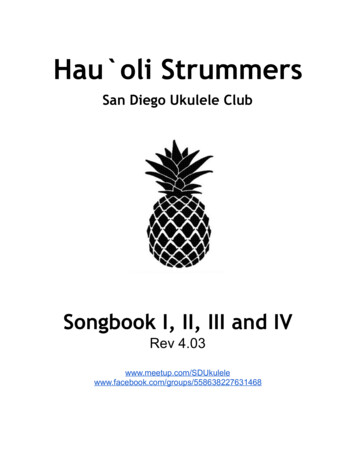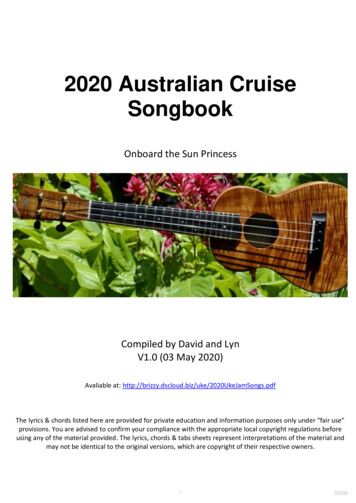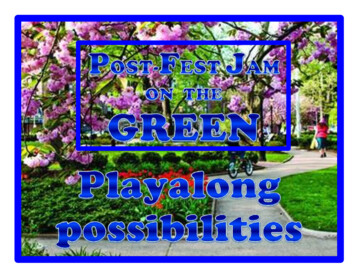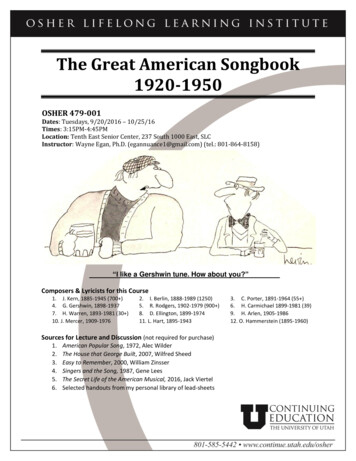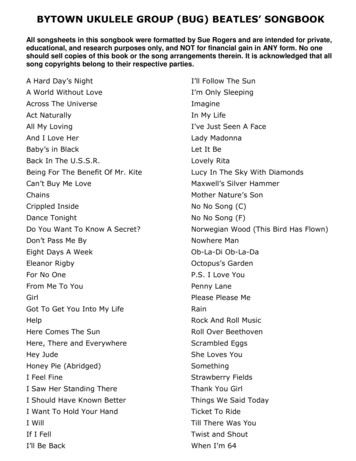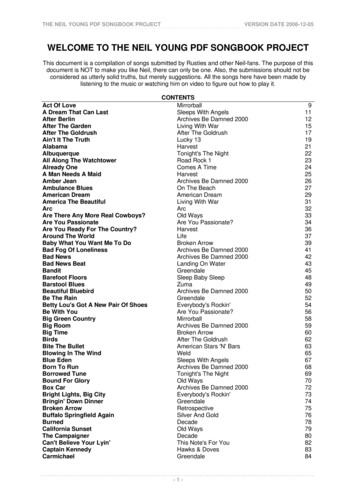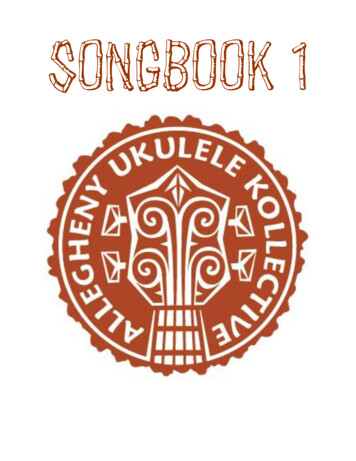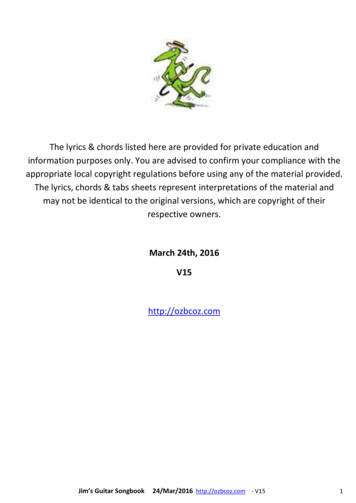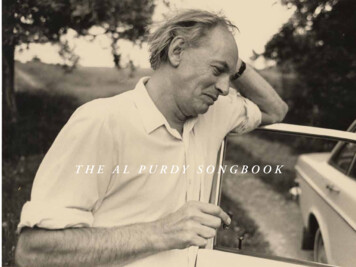
Transcription
The Al Purdy Songbook
Al Purdy inspired generations of writers and musicians,from Leonard Cohen to Bruce Cockburn, Gord Downie to Sarah Harmer.Together they built the bonfire that is The Al Purdy Songbook.Al Purdys Bruce Cockburn 6:052. Transient Doug Paisley 4:143. Just Get Here Sarah Harmer 4:284. The East Wind Gord Downie 4:285. Sensitive Man Jason Collett 5:326. Outdoor Hotel Snowblink 3:437. Unprovable Greg Keelor 4:268. Wilderness Gothic Margaret Atwood 3:009. At The Quinte Hotel Gord Downie 3:0810. Say the Names Bidiniband & the Billie Hollies 4:1911. The Country North of Belleville Felicity Williams12. Necropsy of Love Leonard Cohen 1:2213. Cowboy Casey Johnson 3:081. 34:543-Disc set The Al Purdy Songbook CD DVD and Blu-ray discs of the documentary feature Al Purdy Was Herealpurdy.ca alpurdywashere.ca borealisrecords.com & 2018 Borealis Records. All rights reserved. Manufactured in Canada. Unauthorized reproduction, copying and rental of this recording is prohibited by law.
THE AL PURDY SONGBOOKProduced by BRIAN D. JOHNSON & JASON COLLETTCo-Producer Jake YanowskiMastered by Harris Newman @ Grey Market MasteringArt Direction, Design & Layout by A MAN CALLED WRYCRAFT wrycraft.comCover and last page of booklet photos by SHELLY GRIMSONSpecial Thanks to Bill Garrett, Grit Laskin & Linda Turu at Borealis RecordsThanks to Jean Baird Jody Colero Bruce Cowley Kevin Drew Bernie Finkelstein Jason GilenoMarni Jackson Robert Kory Daniel Lanois Robin Mirsky Michael Ondaatje Jenn PresseyEurithe Purdy Damian Rogers Howard White Aubrey Winfield Bob Young Neil YoungAl Purdy Was HereDirected And Produced by Brian D. JohnsonCo-Producer Jake YanowskiExecutive Producer Ron MannWritten by Marni Jackson & Brian D. JohnsonDirector Of Photography Nick De PencierEditor Nick TaylorComposer Casey Johnson
Al Purdy Was Here on DVD & Blu-rayWith subtitled versions of the movie in French, Spanish and Portuguese (92 minutes)SPECIAL FEATURES Felicity Williams records “Woman” at the Purdy A-Frame (1:55) Live performances from The Al Purdy Show at Koerner Hall in Toronto, February 6, 2013 Gordon Pinsent reads “The Country North of Belleville” (3:52) Dennis Lee reads “My Grandfather’s Country” (6:22) George Elliot Clarke reads “In Cabbagetown” (5:30) Bidiniband & the Billie Hollies perform “Say the Names” (4:13)ARCHIVAL: DEEP TRACKS Selected Purdy a 1973 documentary by Thomas Howe (13:00) Milton Acorn: The People’s Poeta 1971 documentary by Kent Martin and Errol Sharpe (26:57) The Lost Portraits Photographs of iconic writers,taken in 1970 by Shelly Grimson at the age 22 for the landmark anthology 15 Canadian Poets (6:08) Poetry in Motion Purdy reads “To Her in Sunlight” and “The Dead Poet”with images and music (4:14)
(clockwise from top)Leonard Cohen,Sarah Harmer,Gord Downie, Greg Keelor,Felicity Williams,Bruce Cockburn(clockwise from top)Margaret Atwood,Doug Paisley,Casey Johnson,Bidiniband& the Billie Hollies,Snowblink,Jason Collett
AL PURDY: a brief biographyAl Purdy was born December 30, 1918 in Wooler, Ontario and died April 21, 2000 in Sidney, BC. He has been called the first, last andmost Canadian poet. “Voice of the Land” is engraved on his tombstone. But before finding fame as the country’s unofficial poet laureate, heendured years of poverty and failure. Dropping out of high school at 17, he rode freight trains during the Great Depression, worked odd jobs,and served in the Royal Canadian Air Force during the Second World War. Purdy lived all over the country, labouring in mattress factories. In1957, he and his wife Eurithe built an A-frame cabin near his birthplace in Ontario. There, after two decades of writing what he admits wasbad poetry, he found his voice, and finally broke through with The Cariboo Horses (1965), which won the first of his two Governor General’sAwards for Poetry. Purdy published 33 books of poetry, a novel, a memoir, and nine collections of essays and correspondence. In 2008, nineyears after his death, his statue was unveiled in Toronto’s Queen’s Park. Then, after a robust fund-raising drive, the Al Purdy A-Frame Associationbought and restored the A-frame, and launched a writing residency program in 2014. The A-Frame project inspired both the film Al Purdy WasHere and The Al Purdy Songbook.
SUPPORT THE A-FRAMEA share of the proceeds from this three-disc set of The Al Purdy Songbook and Al Purdy Was Here will go to the registered charity thatinspired these projects, the Al Purdy A-Frame Association, which has successfully restored the cabin as a retreat for new generations of writers.Since the program was launched, in 2014, twenty-two writers have passed through the A-frame, with a per diem paid by the Association.They wrote where Al wrote, surrounded by the books he read and the landscapes that spoke to him. His spirit of dedicated risk seems to haverubbed off. A number of residents have published acclaimed volumes of poetry written under the influence of Al.Maintaining the A-frame and the writing program needs your support. Contribute with a tax-deductible donation to one the most excitingliterary arts programs in the country:AL PURDy A-FRAME ASSOCIATION www.alpurdy.ca
ForewordBy Michael OndaatjeForeword to Beyond Remembering: The Collected Poems of Al Purdy 2000 Harbour PublishingWe were very young and he was hitting his stride—Poems for All the Annettes, The Cariboo Horses. There had been no poetry likeit yet in this country. Souster and Acorn were similar, had prepared the way, but here was a voice with a “strolling” not “dancing” gait ormetre, climbing over old fences in Cashel township. (And who ever wrote about “township lines” in poems before Al did?)And with this art of walking he covered greater distances, more haphazardly, and with more intricacy. Cashel and Ameliasburgh andElzevir and Weslemkoon are names we can now put on a literary map alongside the Mississippi and The Strand. For a person of mygeneration, Al Purdy's poems mapped and named the landscape of Ontario, just as Leonard Cohen did with Montreal and its surroundingsin The Favourite Game.We were in our twenties (and I speak for my friends Tom Marshall and David Helwig, who were there with me) and we didn't have asingle book to our names; we were studying or teaching at the university in Kingston. And Al and Eurithe simply invited us in. And why? Because we were poets! Not well-known writers or newspaper celebrities. DidKipling ever do that?Did D.H. Lawrence? Malcolm Lowry had done that for “Al-some-thing or other” in Dollarton, years earlier.These visits became essential to our lives. We weren't there for gossip, certainly not to discuss royalties and publishers. We werethere to talk about poetry. Read poems aloud. Argue over them. Complain about prosody. We were there to listen to a recording he hadof "The Bonnie Earl of Murray.” And sometimes we saw signed books by other Canadian poets. (My favourite dedication among themwas "To Awful Al from Perfect Peggy.") All this changed our lives. It allowed us to take poetry seriously. This happened with and to numerous other young poets all overthe country right until the last days of Al Purdy’s life. He wasn’t just a sensitive man, he was a generous man.Most of all we should celebrate his fervent, dogmatic desire to write poetry. A glass-blower makes money. A worm-picker has a moresteady income. Al, a man who had the looks and manner of a brawler, wanted to be a poet. And what is great is that he was a bad poetfor a long time and that didn't stop him. That's where the heroism comes in.
And when he became a good, and then a g reat poet, he never forgot the significance and importance of thosebad poets—they were rather like those s mall homes and farms north of Belleville, "a little adjacent to where theworld is," and about to sink into the earth. He had been there. It gave his work a central core of humbleness, strange word for Al. Itresulted in the double take in his work, the point where he corrects himself.“I have been stupid in a poem .”As he was not ashamed to whisper in a poem—this in a time of mid century bards. Al never came with bardic trappings.“Who is he like?” you ask yourself. And in Canada there is no one.I can't think of a single parallel in English literature. It almost seems a joke to attempt that. He was this self-taught poet from upthe road. What a brave wonder.So how do we respond to all that Al was and stood for?The great Scottish poet Hugh MacDiarmid, who was pretty close to Al in some ways, had by the time of his death become theembodiment of what his country’s culture was, and stood for, and stood against. Fellow Scottish poet Norman MacCaig recognizedMacDiarmid’s contribution by saying:Because of his death, this country should observe two minutes of pandemonium.
CREATING THE AL PURDY SONGBOOKBy Brian D. JohnsonSo we built a house my wife and Iour house at a backwater puddle of a lakenear Ameliasburgh, Ont. spendingour last hard-earned buck to buy second-hand lumberto build a second-hand houseand make a down payment on a lotso far from anywhereeven homing pigeons lost their waygetting back from nowherefrom "In Search of Owen Roblin," Al PurdyThis album began with a campaign to save a cabin—the A-frame in Ameliasburgh, Ontario, that Al Purdy and his wife Eurithe builtwith their own hands in 1957. Skeptics argued that this ramshackle cottage made with salvaged lumber was beyond salvation. Or notworth the trouble. But that didn't deter a group of the late poet's friends on the West Coast—publisher Howard White, editor JeanBaird, and her partner, poet George Bowering—from their tireless mission of rescuing a literary landmark on the other side of thecountry. Rallying a pantheon of Canadian authors and musicians, they generated a grass roots fundraising campaign to buy the house,and restore it as a writing retreat for a new generation of poets.The campaign seemed as quixotic as Purdy's own career. A high school dropout who worked in mattress factories, he was stillstruggling to make it as poet after 20 years of consistent failure. Then as he set up shop in the A-frame, not far from his birthplace, "atruly remarkable thing happened," writes Howard White in The Al Purdy A-Frame Anthology. "Nurtured by the deep connection he feltwith this place, the man began producing poems of startling originality." By his death, in 2000, "he had produced what many considerthe greatest body of poetry in Canadian literature." The cottage, where Al and Eurithe lived off and on for four decades, became alegendary crossroads for the pioneers of CanLit—a rustic salon irrigated by Al's wild grape wine and homemade beer, and frequentedby writers such as Margaret Atwood,
Michael Ondaatje and Dennis Lee.The point of the A-frame drive was never to enshrine a poet's house. It was to revive its role as a place that would continue theconversation, and incubate new poetry. The event that helped push the campaign over the top was The Al Purdy Show, a benefit atToronto's Koerner Hall, February 6, 2013—with a line-up that included Atwood, Gord Downie, Gordon Pinsent, Dave Bidini and a wholemess of poets.Marni Jackson, who scripted the show, enlisted me to cut some old TV and film clips of Purdy into a montage. It was my firstencounter with the man, who loomed larger than life in the black-and-white footage. At the last minute, we arranged for a cameracrew to film the show for posterity. It turned out to be a singular event, an exhilarating mix of poetry, music and funny stories. Afterthe concert, I blithely suggested the logical next step should be The Al Purdy Songbook—go to the singer-songwriters, who revere thepoets, and get them to create an album of Purdy-inspired music to benefit the A-frame. I had no idea I'd become involved. Or that itwould take over five years for the album come together.The footage from the show became the germ for Al Purdy Was Here, a documentary feature that we created in tandem with theSongbook. Stickhandled by Executive Producer Ron Mann, the film got financed on the basis of a dream cast before anyone had evenbeen approached—including Atwood, Ondaatje, Downie, Bruce Cockburn, Sarah Harmer, Neil Young, Leonard Cohen. Once the wordwent out, it was like a barn raising. The notion that a dead Canadian poet could generate such a response was beyond inspiring. Butit was not just for the love of Al. The project uncovered a deep longing for a place where poetry once mattered, and a time when ourcultural horizons were being opened up, rather than fenced in and cut back—a sentiment that cut across generations, from nostalgicboomers to young artists wanting to experience a kind of Canada they never knew.In our pitch to potential Songbook contributors, we tried to make the parameters as broad as possible. Most of Purdy's poemsdon't rhyme or follow a strict metre, so you can't just flip them into lyrics. Musicians were urged to take poetic license and adapt hiswork as freely as they liked. They could plunder a single poem or a dozen. Or draw inspiration from the whole canvas of Al's life andlandscapes. The result was an uncanny convergence of songwriting talent around the work of a Canadian poet.***
THE ARTISTSJason Collett, who has been combining literary and musical talent for years in Jason Collett's Basement Revue, agreed toco-produce the Songbook without a moment's hesitation. He also came up with a soulful track called Sensitive Man, named after anironic boast from Purdy's epic tale of a barroom fight, At the Quinte Hotel. Featuring The Band's Garth Hudson on organ and accordion,Jason's vocal captures Al's yearning spirit in a droll yet vulnerable portrait of an artist who was "born a middle aged man with belly andballpoint pen” who “built a frame to fill with mythology/late night brawls and epiphanies/a northern nobility that we couldn't quiteconceive/where a country could imagine itself."Bruce Cockburn was one of several contributors already deeply familiar with Purdy, and he embraced the challenge as if it weresomething he'd been itching to do for years. In 3 Al Purdys, a rousing six-minute epic, Bruce lets Purdy's words come tumbling throughthe verses as if poured from a pitcher of draft. A generous portion of his lyrics come straight from Transient, Al's 1967 poem abouthopping boxcars on the way to Vancouver as a teenager. The song's refrain—I'll give you 3 Al Purdys for a twenty-dollar bill—wasinspired by Bruce's distant memory of a poet selling books on a Toronto street corner. That's not something Purdy was ever known tohave done, but it evokes the scrappy character of a poet who could connect with the street. Bruce is the only Songbook artist who triedto capture Al's persona in his voice, adopting a gruff swagger quite unlike anything we've heard from him before. This was the first songBruce had written in two-and-a-half years, ever since becoming a father, and it kindled a new burst of songwriting that led to his 33rdalbum, Bone on Bone, and 13th Juno Award.Doug Paisley was a teenager when he met Purdy at a poetry reading at the Red Dog Tavern in Peterborough, Ontario. Hehad him autograph a pack of rolling papers, and became a lifelong fan, amassing a personal collection of rare editions. Doug's song,Transient, takes its title from the same poem that Bruce Cockburn draws on, and channels Purdy's experience riding the rails. But it's amore intimate ballad, capturing the romantic side of a young man who has his eye on the horizon while his heart pulls him home. Dougrecorded the song twice, first for the cameras, as he sang it solo with his guitar in his living room, then in the studio with a band. Inthe film, we merged the two versions to forge a soundtrack for Al's early years.
Margaret Atwood found time between being a prolific author, an ambassador for the Handmaid's Tale, and an unflaggingactivist, to serve as one of the A-frame campaign's most dedicated supporters. In Toronto's Pilot Tavern, she reminisced about her oldfriend Al for the film then shot some pool. Later, in the book-lined basement office of her home, she recorded a reading of WildernessGothic. After the first take, which was flawless, I asked if she would do a second take just to see where it might go. She agreed, onlyafter telling us it would be no different. She was right. She's always right. We used the first take.Dave Bidini was turning Purdy's poetry into music long before the Songbook was conceived. Among singer-songwriters, he mayhave been the first responder. As much author as musician, he became familiar with Purdy when he was working with McLelland &Stewart, Al’s publisher at the time. "His books were always around," Dave recalls. "I couldn't believe that Naked With Summer in YourMouth wasn't written by an 18-year-old." (Purdy wrote it at 74). Dave slipped a sample of Al reading the last three lines of "WildernessGothic" into "Me and Stupid," a track on the Rheostatics 1994 album, Introducing Happiness. And his Bidiniband recorded "Say theNames" with the angelic Billie Hollies for their 2014 album, The Motherland. Opening with Purdy reading some lines from Necropsyof Love, it drifts into a choral incantation of him hailing Indigenous place names versus their colonial substitutes. Published a yearbefore his death, "Say the Names" was one of Purdy's last poems. Before "Voice of the Land" would be engraved on his tombstone,he reminds us that the real Voice of the Land belongs to Native Peoples, and flows directly from Nature—"you dreamed you were ariver/and you were a river."Gord Downie, like Bidini, fell under Al's influence early in the game. Next to Leonard Cohen, it's hard to think of a majorCanadian artist who moved so promiscuously between poetry and songwriting. In 2002 he starred in a short film dramatizing At TheQuinte Hotel, Purdy's bittersweet yarn about a moment of truth in a tavern brawl. The Songbook offers his live performance of it at TheAl Purdy Show. Before his death, Downie also offered up "The East Wind," a Purdy-influenced song he'd recorded with the Country ofMiracles for their 2010 album The Grand Bounce—with a couple of lines from, once again, "Necropsy of Love."
Neil Young was approached to write a Songbook number. For inspiration, we sent him Al's "My '48 Pontiac," a noir chroniclefrom the viewpoint of a car in a junkyard. Neil liked the poem, and the project. He never got around to writing a song, but graciouslydonated his 1971 Massey Hall performance of Journey Through the Past to the film's soundtrack.Leonard Cohen met Purdy in Montreal in the 1960s. They were never close, and as poets they were from different planets. Butthey shared a friend in poet Irving Layton, and Cohen's enduring respect for Purdy was clear when he stepped up as one of the firstluminaries to make a substantial donation to the A-frame campaign. I thought of asking him to read "Necropsy of Love" for the film,but it seemed too obvious. This spare poem about love and death, which Al wrote in his early 40s, reads so much like a Leonard Cohenpoem to begin with. So I sent him "The Country North of Belleville", hoping to create a canonical moment for Canadian literature. Hedeclined, saying he would need help pronouncing all those Scottish names, and besides, he didn't understand the poem. I finally senthim "Necropsy of Love," and Leonard wrote back, "I'll give it a shot." Indeed. In early October 2014, while recording his final album, YouWant It Darker, Leonard found a moment to make Al's words his own with heartbreaking gravity and grace.Casey Johnson composed and produced the original score for Al Purdy Was Here. With performances by songwriters occupyingso much of the movie's musical real estate, the score had to play a constrained and specific role. Casey’s method was right in tune withPurdy’s desire for authenticity: he recorded the entire score using vintage analog equipment. The Songbook's final track, "Cowboy,"was created for a sequence early in the film that establishes Al's character as a laconic outsider striding into the quiet saloon of CanLitand creating a stir. Sailing over the track is David Chan's sublimely lazy, cantina-like trumpet. David prefers to play outdoors, so Caseyset up a microphone on the sidewalk and wired him into the studio.
1.3 Al PurdysBruce CockburnStand in the swaying boxcar doorwaymoving east away from the sunset andafter a while the eyes digest a country andthe belly perceives a mapmaker's visionin dust and dirt on the face and hands hereits smell drawn deep through the nostrils downto the lungs and spurts through the bloodstreamcampaigns in the lower intestine andchants love songs to the kidneysAfter a while there is no arrival andno departure possible any moreyou are where you were always goingand the shape of home is under your fingernails.I'm a product of some parentsof the sort that shouldn't breeddidn't get much schooling past learning how to readgot the poetry bug in some forgotten institutionwhen first I did embark on my career of destitutionthe beauty of language set a hook in my soulme like a breadcrust soaking soup from a bowlYou can call this a rant but I declare I declaimAl Purdy's poems are the name of the gamethe winds of fate blow where they willI'll give you 3 Al Purdy's for a twenty dollar billPorkers in the counting house counting out the baconmatter's getting darker in the universe they're makingthey love the little guy until they get a better offerwith the dollar getting smallerthey can fit more in their coffersand the doings on the corner neither sung nor seenthey're circling the shopping cartsat Sherbourne and QueenI resemble that assembly but I'm not the sameAl Purdy's poems are the name of my gamethe winds of fate blow where they willI'll give you 3 Al Purdy's for a twenty dollar billYou can spit on the prophet but respect the wordI've got some lines I want to spin youthat you ought to have heardthe winds of fate blow where they willI'll give you 3 Al Purdy's for a twenty dollar billthe winds of fate blow where they willI'll give you 3 Al Purdy's for a twenty dollar billAnd after the essence of everythinghad exchanged itself for words and becameanother being and could even be summonedfrom the far distance we chanted a spell of names
and we said "mountain be our friend"and we said "River guard us from enemies"And we said what it seemed the gods themselvesmight say if we had dreamed them and theyhad dreamed us from their high placesand they spoke to us in the forestfrom the river and the mountainand the mouths of the ochre-painted deadhad speech again and the watersspoke and the speech had wordsand our children rememberedBruce Cockburn - guitars and vocalScott Amendola - drumsJohn Shifflett - upright bassJulie Wolf - accordionGary Craig - fan and other percussionJohn Dymond - electric bassRon Miles - coronetProduced by Julie WolfRecorded & Mixed by Adam MuñozLyrics by Bruce Cockburn and Al PurdyMusic by Bruce CockburnCourtesy True North Records, Bruce Cockburnand the Al Purdy Estate/Harbour Publishing Holy Drone Corp 2015
2.TransientDoug PaisleyRiding on an eastbound trainTrying to get home againBehind the coal fire burning brightStanding like an old scarecrowLassos around your throatPloughed furrows in your brainCross the Continental DivideDigging in the great landslideBeside a silver river of lightOut beyond the last streetlightReach across the distance tonightIs there something you could doRunning from Sault Ste MarieCaught a deadhead on the KootenayRode a steel dream through the nightThis is my blood flowing into youAll the work must be undoneThe faraway bells are ringingYou've been away from home so longAnd when it's time for saying goodbyeWe know we won't see each other againBut I can still hear your voiceCasinos and the parking lotsAll the criminals have been caughtThey emptied out the nightAnd when it's time for saying goodbyeWe know we won't see each other againBut I can still hear your voiceDoug Paisley - Vocal, guitarRob Drake - drumsDarcy Yates - bass guitarRobbie Grunwald - keyboardsRecorded and Mixed by Stew CrookesLyrics by Doug Paisley and Al PurdyMusic by Doug PaisleyCourtesy of Doug Paisley and the Al Purdy Estate/Harbour Publishing Doug Paisley 2015
3.Just Get HereSarah HarmerIf I was a crow I'd fly the roadsthat wind between these placesOver back lanes and weathered veinswhere creeks have left their tracesFruit trees planted long agostill bloom every other seasonFence won't keep the rabbits outGate's always open for some damn reasonFollow and trace the coastline's laceto a place that's worn and storiedAt the end of their chain the Great Lakes draininto the old St LawrenceOh we've held party or twoSlept a million dreamerswho woke to find the coffee onThough the smoke is gone the poetry lingersIf you're too tucked away and you can't see the sunIf you've something to say but you ain't got no oneWhatever you do if you have to use your thumbJust get here, just come.If you come out at night you'll see the lightand where to make the turn offBut do call ahead we might be in bedor writing with our clothes offWriting under wallpaper, writing on the wombThough poets die a lullabystill whispers faintly in the roomIf you're too tucked away and you can't see the sunIf you've something to say but you ain't got no oneWhat ever you do if you have to use your thumbJust get here, just comeIf your too tucked away and you can't see the sunIf you've something to say but you ain't got no oneIf your hands are getting coldand you don't know what you've becomeIf I was a crow I'd fly the roadsthat wind between these placesWhere poems were read and hungers fedand hearts were warm and graciousDid we keep a guestbook somewhereor are the records fading?We'll make a vow to start one nowthere is still time but it's not waitingSarah Harmer - vocals and pianoLyrics by Sarah Harmer and Al Purdy; Music by Sarah HarmerEngineered and Mixed by Aaron HolmbergCourtesy of Pare Publishing the Al Purdy Estate / Harbour Publishing Cold Snap Records 2015
4.THE EAST WINDGord Downie & The Country of MiraclesNight is like a roomIt makes the little thingsIn your headToo importantIt doesn’t go around you, it goes through youIt doesn’t go around you, it goes right throughNo I do not love youHate the wordRun to the outsidePublic soundIt doesn’t go around you, it goes through youIt doesn’t go around you, it goes right throughHello again my friendsI’ve come to see you againI'm the East WindThe laziest WindProduced by Chris WallaGord Downie - vocalsJulie Doiron - vocals, guitar, bassJosh Finlayson - bass, guitarDale Morningstar - lead guitarDave Clark - drumsDr. Pee - keyboardsCourtesy Universal Music Canada Gord Downie and The Country of MiraclesPHOTO BY Andrew Tolson/Maclean’sHello again, my friendsI’ve come to see you againLike the East WindThe laziest windIt doesn’t go around you, it goes through you
5.Sensitive ManJason CollettI was born a middle aged manwith belly and ballpoint penyou know I ama sensitive manwith a hammer and a sawbent nails and as many beersI built a frame to fill with mythologylate night brawls and epiphaniesa northern nobilitythat we couldn't quite conceivewhere a countrycould imagine itselfpissing on a starstop exactly where you area fifty thousand gallon tank of bullshita dirty dishrag for a stiff upper lipand here I am with both hands highunder the skirts of the worldI was born a middle aged manwith belly and ballpoint penyou know I ama sensitive manI went out walking the landI took it all inyou know I ama sensitive manJason Collett - vocal and acoustic guitarMike O'Brian - drumsJason Haberman - bassNeil Quinn - acoustic/electric guitars, background vocalsCarlin Nicholson - pianoGarth Hudson - organ, accordionEngineered by Carlin Nicholson at III Eagle StudioMixed by Howie BeckLyrics by Jason Collett and Al Purdy; Music by Jason CollettCourtesy of Jason Collett and theAl Purdy Estate/Harbour Publishing 2015 Jason CollettPHOTO BY BRIAN D. JOHNSONand we shall build our homewhere running waters gleamand plant the ground with rosesand sow the day with dreamsand we shall live forevera little down the rivera little down the roadthose were back breaking daysin the sun and the rainsurrounded by nothingbut beautiful treesand I hate beautiful trees
6.Outdoor HotelSnowblinkIn the river’s white racket small purple arctic surprisesAll those noisy flowers in water placesyou’ve seen themIn the outdoor hotellovers came this wayto watch the water floor show years agoin the outdoor hotellovers came this wayAll those noisy flowers bodies touching surprisesIn the outdoor hotellovers came this wayto watch the water floor show years agoin the outdoor hotellovers came this wayAnd love the sound of a colour that lasts two weeks in August —Performed by Snowblink (Daniela Gesundheit and Dan Goldman)Adapted from "Arctic Rhododendrons" by Al Purdy (1967)Lyrics by Snowblink and Al Purdy; Music by SnowblinkCourtesy of Snowblink and the Al Purdy Estate/Harbour Publishing Snowblink 2015
7.UnprovableGreg KeelorFor those whose homeIs the windThat lifts the curtains at nightNow there is onlyMyself hereIn this cave of bonesKept prisoner foreverNever to be freeTo hover and hover as a mothAnd unprovable as the sun onthe other side of the worldUnprovable as the sun -un -un onthe other side of the worldAdapted from “Woman” by Al Purdy (1994)Greg Keelor - vocals, guitarDean Stone - drumsGraham Walsh - guitar, bass, keyboardsJulie Fader - vocalsEngineered and Mixed by Graham WalshLyrics by Al Purdy; Music by Greg KeelorCourtesy of Greg Keelorand the Al Purdy Estate / Harbour Publishing Greg Keelor 2015PHOTO BY Marie-France Coallier / Montreal GazetteWhen you wake upAnd you don't know whyShe's there too
8.Wilderness Gothic(1968)Across Roblin Lake, two shores away,They are sheathing the church spireWith new metal. Someone hangs in the
We were very young and he was hitting his stride—Poems for All the Annettes, The Cariboo Horses. There had been no poetry like it yet in this country. Souster and Acorn were similar, had prepared the way, but here was a voice with a “strolling” not “dancing” gait

